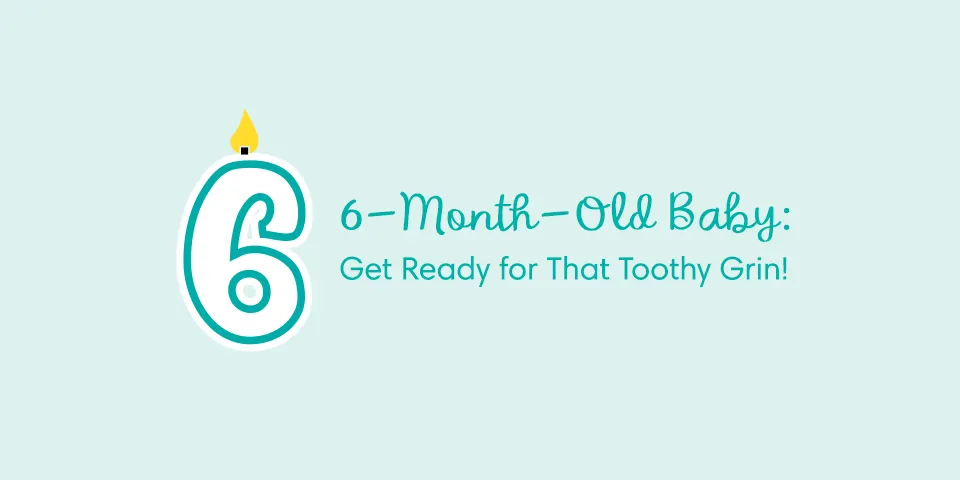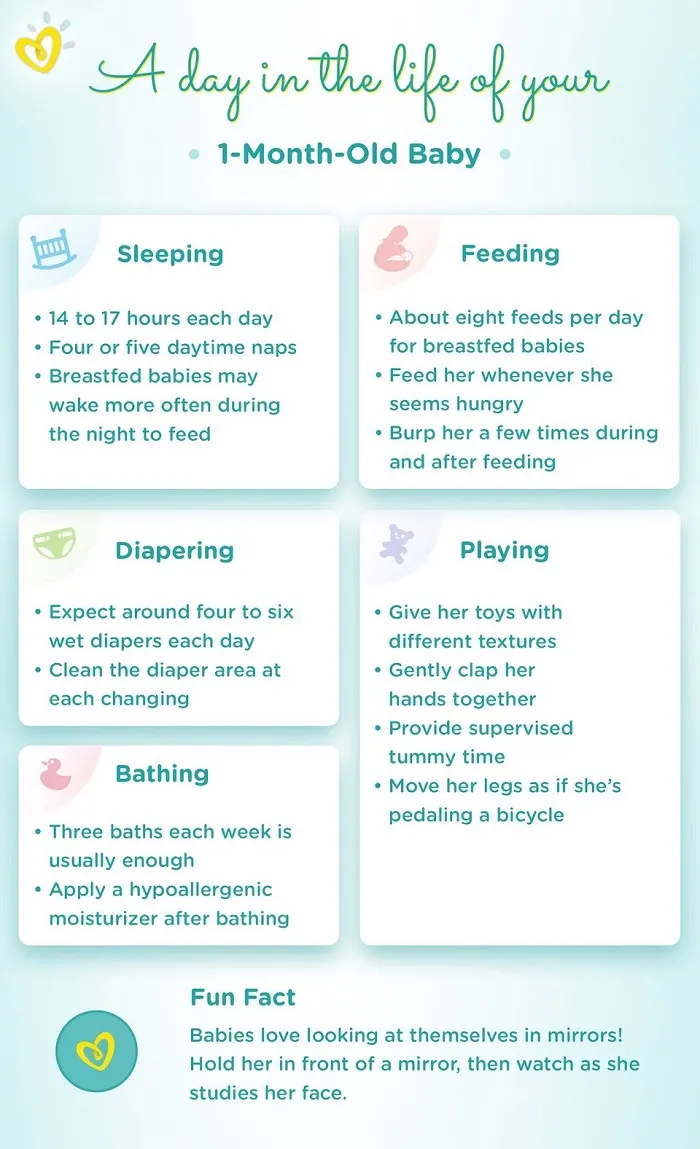6-Month-Old Baby: Get Ready for That Toothy Grin!
Congratulations! Your little wonder is half a year old now. This month may be full of adventure for you and your baby, as he may try sitting up all by himself and might even taste his first solid food. Read on to know all about the 6-month-old baby milestones that your baby may reach, the exciting new foods that he can try, his sleeping and napping routine, and the challenges you may face handling jealous siblings!

Baby Development Milestones
Over the past months, your baby has learnt new skills and abilities like being able to spot objects away from him and tracking moving objects well. When you call out his name, he will stop doing what he was doing and will instantly cheer up. Now that he is 6-month-old, pay more attention so that he doesn't fall off the bed or any higher surface, as he will enjoy rolling over on both sides.
Growth and Physical Development
Babies grow up so fast! Your 6-month baby weight may have doubled. Although not all babies grow at the same rate at this stage, don't be surprised if your little one gains around 450 to 560 gms a month. At this stage, your baby may grow about 1 to 2 cms until he turns 7-month-old.
During this time, your baby may get his first couple of teeth. If not, don't worry, as the age at which teeth first appear varies greatly from baby to baby. Make sure you take care of your baby's teeth and gum. Those first teeth are quite tiny, and it is normal to wonder about how to keep them clean. Simply brush them gently with a soft, child-size toothbrush and a grain-size bit of toothpaste. To know more about your baby’s growth, you can use our very own baby growth chart.
Avoid letting your baby fall asleep with a bottle in his mouth to help prevent cavities. It will also prevent a condition called bottle mouth, in which the sugars from milk or juice impact the enamel of the teeth. Read more about baby teething here.
Senses: Your Baby Can See Across the Room
Around this time, the depth perception of your little wonder has improved. Now, your baby will be able to see much further away, probably even several feet away or more. Moreover, your baby can also focus on objects without getting cross-eyed and may also be able to differentiate between colours.
Movement: Sitting with Support
Your baby is becoming stronger and more active by the day. By this time, your 6-month-old may be able to roll over in both directions. So, keep an eye on him to make sure he doesn't roll off the bed or couch. Avoid letting him surprise you unexpectedly with this newfound skill. Every movement is preparing him for the next step. With his trunk and neck becoming stronger, he may also be able to sit when you place him in a seating position with some support. Over the weeks, he'll become more confident, and soon he'll also begin staying in the seated position without any support.
Personality: Your Baby Recognises His Name
After spending his first few months listening to your voice and noticing the sounds you make, your baby is slowly learning to communicate. He may also start imitating the sounds of speech somewhere around this time. He may perk up and notice when you call him by his name. Even if you speak the word of his name, you will notice him pause the thing he's doing. As time progresses, your baby will begin associating words with objects. You will be thrilled to watch him develop his language skills over the coming months! While your little one continues to grow and becomes more active and curious, he may also become a little feistier. Make sure you set boundaries and let your baby know about discipline to keep him safe. Let your little one what behaviour is acceptable and unacceptable through the boundaries you set. Avoid punishing him for his overly assertive behaviour, instead reward his acceptable behaviour. If you notice your baby doing something unacceptable, stop him and let him know that it's wrong, rather get him interested in a better activity.

How to Support Your Baby's Development
You can actively be a part of your baby's learning journey by reading, talking, singing, and playing with him daily. It will not only help you both bond but also help develop his brain. Think of the words your baby hears as seeds that will get planted in his mind, helping him grow a vocabulary forest in his brain. Reading aloud will help teach him new words and about the world, encourage him to listen, introduce him to new concepts and ideas, and give him lessons in how to communicate. Reading will help your baby grow socially and emotionally, especially if you read with emotions and sound effects. This will make your baby want to look, point, and touch the page while you are reading. It will also help build his thinking skills and social development. As he listens to more words, he'll try to mimic sounds, memorise words, and recognise pictures. Make sure you set some time of your day aside to read, and soon you'll notice that this activity is loved by both of you.

What to Know About 6-Month Baby Food Habits
As your baby turns 6-month-old, now is a good time to introduce him to solid foods. You can feed your baby during the day when he is not feeling tired and is a little hungry. Place him on your lap or an infant seat while feeding him using a small spoon. Hold the spoon close to his lips so that he can smell and taste the food. If he rejects the food, try again a minute later. It's quite normal if the first few spoonful of food end up on the bib, tray, or your baby's chin. Read here for few tips on how to burp your baby.
If you aren't sure about what to feed your baby, it is best to speak to your baby's paediatrician for advice on baby food after 6 months. Make sure you introduce only one new food at a time to your baby and wait for a few days before adding new food to the menu, like pureed vegetables or fruit. Pay attention to your baby's health and watch out for any rashes, diarrhoea, or vomiting. If you notice anything unusual or if you and your partner have any food allergy, consult your doctor to rule out any food allergies or sensitivities. While feeding your 6-month-old baby food, ensure you make him sit in an upright position. Give him soft and easy-to-swallow food to prevent choking. Avoid adding baby cereal to the bottle to prevent a choking hazard. Your paediatrician may recommend bottle feeding a thickened formula if your baby has reflux.
Although your baby is now feeding on solid food, he will still need breast milk or formula. Around 6 months old, your baby may be needing up to 230 ml of breast milk or formula every four to five hours.
Your baby's mealtime and menu may change, but one thing that remains constant is the dirty diapers. But guess what! Diaper shopping can be quite rewarding! Since your baby goes through a lot of diaper changes, her skin might be prone to diaper rash. So, make sure you use the one that is suitable for her delicate skin. You can try from a wide range of Pampers® diapers like Premium Care if you haven't already. Also, did you know you can now turn your diapers into rewards like gift cards, cashback, and more? Download the Pampers App for more. Read on to know more about how to change a diaper, and you will surely get the hang of it. You can also check the ultimate diaper bag checklist for you newborn baby.

How Much Sleep Does a 6-Month-Old Baby Need?
At 6 months, your baby may sleep for about 12 to 16 hours every day with around nine hours of sleep at night (sometimes even longer with a few brief awakenings) and around two or three naps during the day. Giving your baby a warm bath or gentle massage followed by rocking or feeding will help your baby sleep.

A Day in the Life of Your Baby
Every baby is different, but you can set a schedule for eating, sleeping, bathing and playtime routine. Here is an example of a daily schedule you could choose to follow for your baby:

Your Baby's Health: Earaches and Infections
As your little tot becomes more mobile and reaches for more objects, the risk of catching an infection is more. Make sure you keep your baby away from people with the flu or any other infectious disease. However, sometimes, it is not possible to protect your baby against sickness. Here are some common health problems 6-month-olds may have:
Diarrhoea:
It can be due to contact with viruses or bacteria
It can be due to new foods like fruit juice
It can be due to some food allergy.
Fever:
Temperature can be higher than those of older children
It may not be on its own but rather a symptom of something else
It can indicate that your baby's body is fighting infection.
Earache or ear infection:
Middle ear infections are common for children between 6 months and 3 years of age
Mostly occurs after a child has had a cold
In case of any irritation, give your baby acetaminophen, ibuprofen, or use ear-drops after consulting the doctor
Use a warm compress on your baby's ear to help ease the pain
It can be caused by bacteria and may require antibiotics, so consult the doctor for treatment options.
If you notice any of these, it is best to get your baby checked out by the doctor to rule out any serious problems and for appropriate treatment. Did you know, your baby’s poop can tell a lot about your baby’s health? Learn all about baby poop with this ultimate baby poop guide. When your baby reaches out to grab things, as he continues to explore the world, be careful about the things his little hands touch. As babies love putting objects into their mouths, avoid giving your 6-month-old any food or toys that may be a choking hazard. Also, do not keep any dangerous stuff within his reach.

FAQs at a Glance
You can get him toys like a rattle, a child-safe mirror, or a ring stack that will help stimulate your baby's development.

Your Life as a Parent: Dealing with Jealous Sibling
If you have older children who are under 2 years of age, you may notice sibling rivalry. As your younger one is growing up and demanding more attention, your older one may start feeling a bit upset about sharing the attention. You can involve your older child in more 6-month-old baby activities like reading a story or singing a song together to help soothe his feelings. This way, your older child will not feel left out, and all of you can have some fun together.





